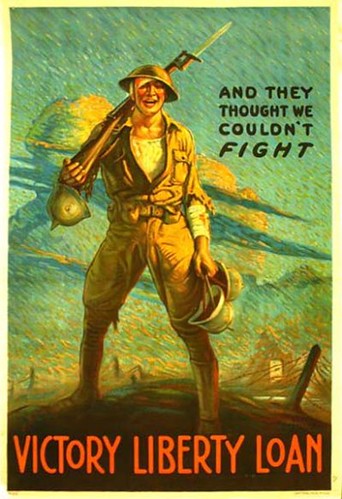http://www.flickr.com/photos/mfspeccoll/4899716737/in/set-72157624742434942
 This poster appeals to a sense of adventure and victory. The man in the image is depicted as smiling triumphantly, holding several German helmets. This image is in the minds of many young men who want to enlist in the military, and plays to their emotions. It encourages them to join the war effort and prove that they can fight, and in a way prove their worth to whomever they think is watching. They want the glory of coming home with minor bandaged wounds, a smile on their face and the helmets of their enemies in their hands. According to this poster, after all, the worst that could have happened would be a scrape on the head or arm, with no permanent damage. In the world of this image, there are no amputations, no fatal head wounds, and everyone comes home smiling. It is a bright day in the image, possibly a sunset. This adds to the feeling of unreality and superiority, being illuminated as though on a pedestal. I think this kind of poster would have had a strong influence on independent people like Roland, who wanted to earn medals and be recognized as heroes.
This poster appeals to a sense of adventure and victory. The man in the image is depicted as smiling triumphantly, holding several German helmets. This image is in the minds of many young men who want to enlist in the military, and plays to their emotions. It encourages them to join the war effort and prove that they can fight, and in a way prove their worth to whomever they think is watching. They want the glory of coming home with minor bandaged wounds, a smile on their face and the helmets of their enemies in their hands. According to this poster, after all, the worst that could have happened would be a scrape on the head or arm, with no permanent damage. In the world of this image, there are no amputations, no fatal head wounds, and everyone comes home smiling. It is a bright day in the image, possibly a sunset. This adds to the feeling of unreality and superiority, being illuminated as though on a pedestal. I think this kind of poster would have had a strong influence on independent people like Roland, who wanted to earn medals and be recognized as heroes.

Comments
Jeff Drouin
Sun, 02/03/2013 - 19:41
Permalink
OK, but say a little more.
OK, but say a little more. How does the intro on reading posters by Pearl James figure in to your assessment of the poster. What is the country of origin? And, given that, who are the "they" that thought "we" couldn't fight, and why would a recruiter want to call attention to that? Read a little more into the text and message.
Will Boogert
Sun, 02/03/2013 - 20:59
Permalink
It's interesting that this
It's interesting that this poster focuses on the triumph of victory rather than the battle that inevitably came before it. It makes the leap from joining the army to winning a battle, skipping over the fighting of the battle itself. It uses the positive images of the bright sky and the smile on his face, like you say, to emphasize his own pride in having accomplished something, which is concretized by the German helmets that he holds. He also gets the satisfaction of proving wrong whoever thought they couldn't fight, and I would be curious to know exactly who doubted their ability.
Katie Boul
Mon, 02/04/2013 - 14:21
Permalink
I think your point about the
I think your point about the poster focusing on the triumph of victory rather than the battle is very important. This poster is yet another glamorization of war, and even goes so far as to claim that fighting in WWI will bring you joy. Knowing what we know now about the war, it's difficult to believe that anyone would ever look at the War as a path to happiness.
Katie Boul
Mon, 02/04/2013 - 14:21
Permalink
I think your point about the
I think your point about the poster focusing on the triumph of victory rather than the battle is very important. This poster is yet another glamorization of war, and even goes so far as to claim that fighting in WWI will bring you joy. Knowing what we know now about the war, it's difficult to believe that anyone would ever look at the War as a path to happiness.
Jeanine de Leon...
Mon, 02/04/2013 - 17:03
Permalink
This rendition of the soldier
This rendition of the soldier shows America and American soldiers in all their optimism in feeling that not only can they win the war, but that they can ‘fix’ the problems in Europe. This shows the best of what is seen in the American soldier and the one attribute which many of the people in Europe actually commented on to their peers. In many ways, it shows the age-old coming of age ritual of becoming a soldier; proving one’s mettle, and would appeal to those who believed in the glory and honor of defending their country. It is unreal in the sense, that it shows none of the horrors of the actual events of the war, but only portrays a rosy optimism of the future.
Jeanine de Leon-Maestas
Victoria McGouran
Mon, 02/04/2013 - 18:42
Permalink
When I saw this poster I
When I saw this poster I really wanted to write about it because of everything you described. The idea of returning home with eternal glory or whatever was so prevalent in war posters and this one in particular captures, as you said, the unreality of the situation. Also, the idea of conning young men into "proving their worth" or manliness I thought was really interesting as well. Great post!